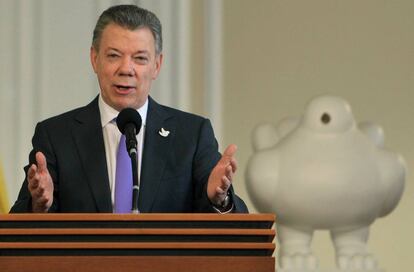Colombian president extends ceasefire with FARC until end of year
Juan Manuel Santos denies date is final as he fights to push forward stalled peace process

The president of Colombia announced on Thursday that the current ceasefire between government forces and the Revolutionary Armed Forces of Colombia (FARC) would be extended until December 31.
The announcement marks the second such extension to the ceasefire since voters in the South American country narrowly rejected a hard-won peace deal in a plebiscite on October 2.
That shock result has plunged the country into a dangerous limbo, and fraught three-way talks are now underway between the Colombian government, the FARC and the chief opponents of the peace deal – a group headed up by former president Álvaro Uribe – as the country seeks a new way forward for a peace deal that promised to help end a 52-year civil war which has cost the lives of 220,000 people.
An earlier announcement by Santos that the ceasefire would only remain in place until the end of October was seen by many observers as a way of piling pressure on Uribe, now a senator, to come up with a way to push forward the stalled peace process as soon as possible.
On Thursday, however, Santos, who was awarded this year’s Nobel Peace Prize for his role in brokering the deal with the FARC, said the new date was not an “ultimatum or a final date.”
“I hope this whole new process towards getting a new deal ends a lot earlier,” he said.
The second ceasefire extension comes after two weeks of talks with the Democratic Center party of former president Uribe. Uribe, who has emerged as the big political winner in the aftermath of the recent plebiscite, campaigned against the original peace deal on the grounds it would allow the FARC to enter mainstream politics and see former members escape prison time.
I have extended the ceasefire because the young people at the peace camp in Bogota asked me to
President Juan Manuel Santos
He and his party have now submitted a 26-page document to Santos’ negotiating team which includes calls for tougher legal penalties for FARC members found guilty of crimes against humanity, and for those members to be barred from holding congressional or senatorial seats.
But Santos on Thursday deflected attention away from Uribe’s role in the peace process, choosing instead to highlight the words of the people who have gathered at a makeshift peace camp in Bogota.
“They demanded that I set urgent limits. They told me we can’t start again from scratch. Many of them insisted that the current [peace] accords have to remain in force,” said the president.
“For this reason, and because these young people asked for it, I have taken the decision [to extend the ceasefire],” he said.
The reasons for the rejection of the peace deal in the recent plebiscite are numerous, with some key factors being a deep distrust of the FARC among Colombians, and the perceived arrogance of Santos and supporters of the peace deal in assuming voters would back the deal's text.
Observers have also noted that President Santos and his campaign had certainly failed to convince many of the country’s 10 million Evangelists (out of a population of 48 million) that the accords with the FARC, which took four years to reach, did not “endanger the traditional family.”
Santos was already very unpopular with Colombia’s fundamentalist Christian groups, which have vehemently opposed legislation liberalizing abortion rights and permitting same-sex couples to marry and adopt children.
Colombia’s media has noted that Gina Parody, who led the government’s Yes campaign in the run-up to the referendum, stepped down as education minister following the defeat. Parody, a lesbian, has faced a sustained campaign against her from right-wing groups over her sexual orientation.
English version by George Mills.
Tu suscripción se está usando en otro dispositivo
¿Quieres añadir otro usuario a tu suscripción?
Si continúas leyendo en este dispositivo, no se podrá leer en el otro.
FlechaTu suscripción se está usando en otro dispositivo y solo puedes acceder a EL PAÍS desde un dispositivo a la vez.
Si quieres compartir tu cuenta, cambia tu suscripción a la modalidad Premium, así podrás añadir otro usuario. Cada uno accederá con su propia cuenta de email, lo que os permitirá personalizar vuestra experiencia en EL PAÍS.
¿Tienes una suscripción de empresa? Accede aquí para contratar más cuentas.
En el caso de no saber quién está usando tu cuenta, te recomendamos cambiar tu contraseña aquí.
Si decides continuar compartiendo tu cuenta, este mensaje se mostrará en tu dispositivo y en el de la otra persona que está usando tu cuenta de forma indefinida, afectando a tu experiencia de lectura. Puedes consultar aquí los términos y condiciones de la suscripción digital.









































